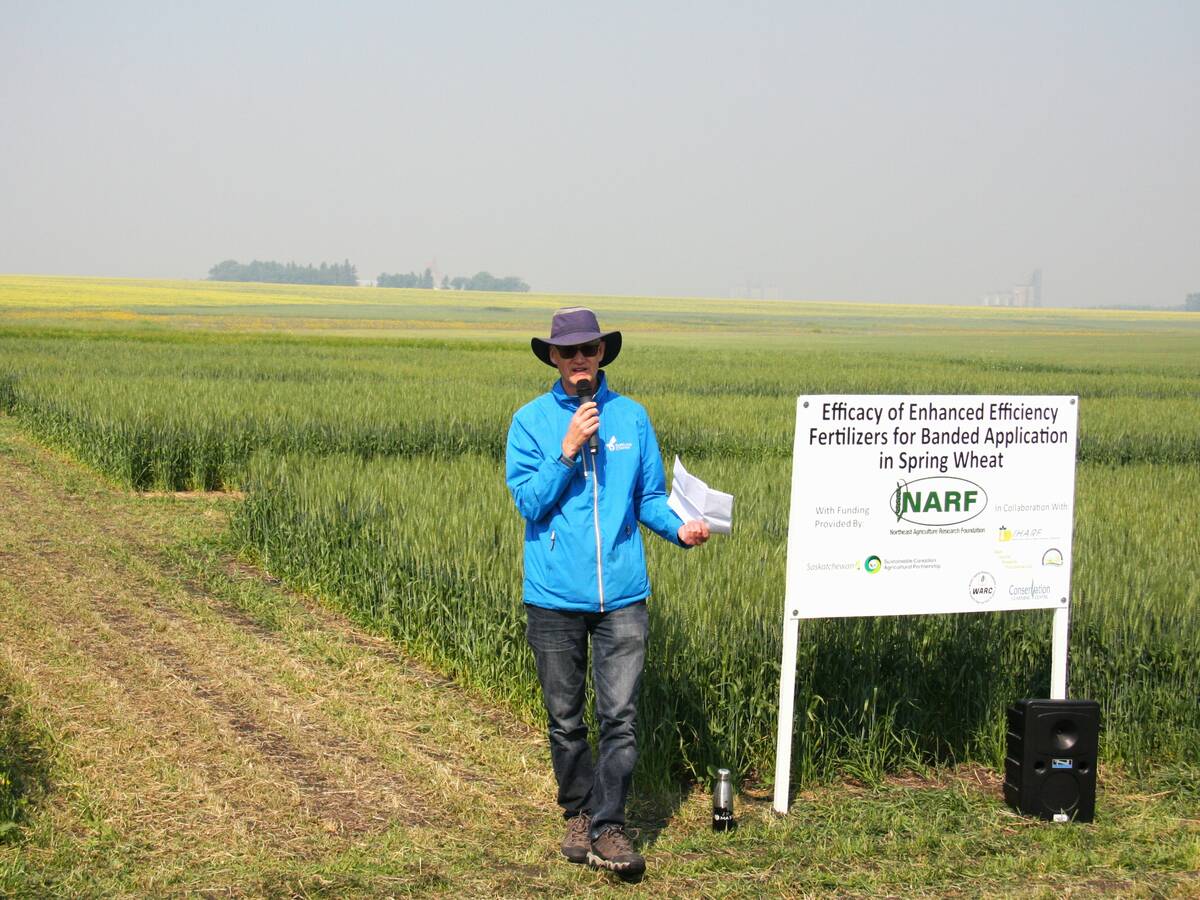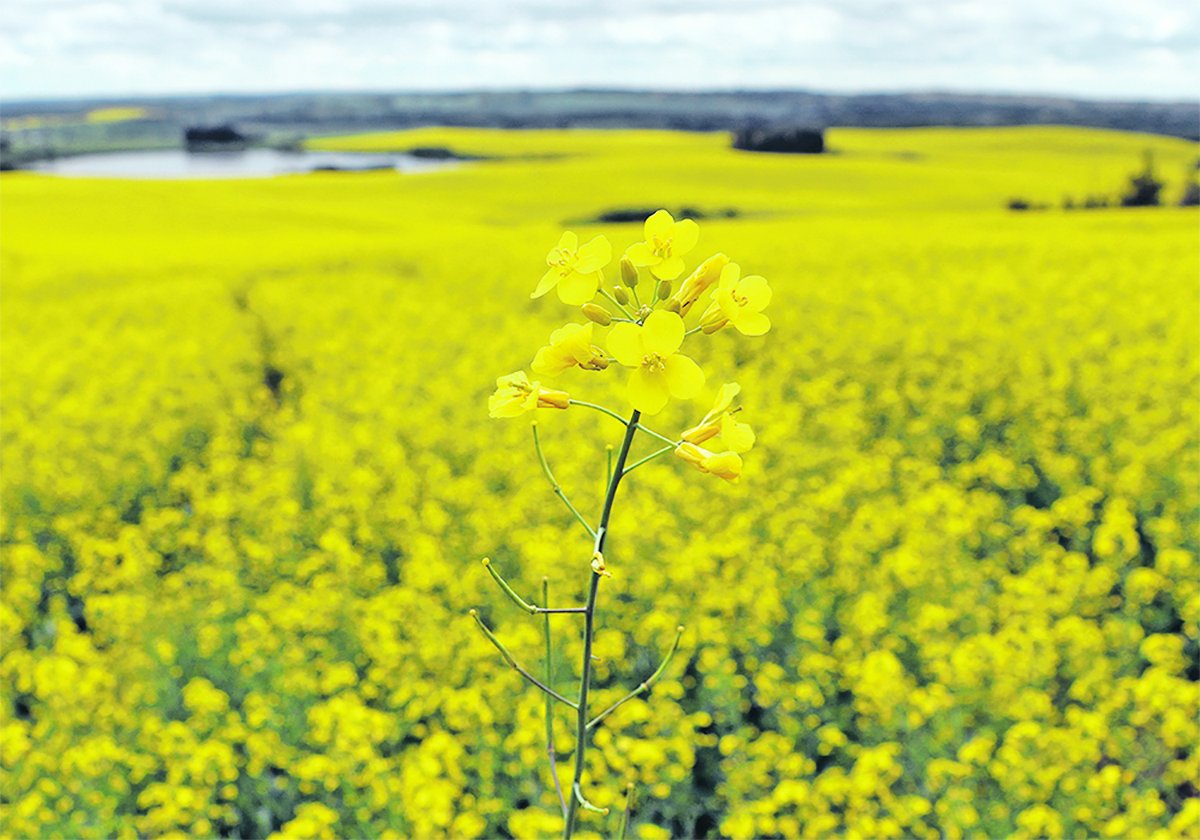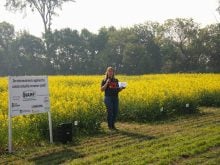At the Ag In Motion farm show, companies describe premiums available to farmers
Canola growers have choices when it comes to trying to get a premium for proving they farm sustainably.
Most of the major seed providers are putting together programs that reward farmers for operating in a manner that allows food companies and others to plausibly claim that their crops don’t hurt the planet.
Other stories in the Canola Yearbook 2024:
- A new era for crop genetics
- Shrinking production estimate supports canola bids
- Canola goals must be reassessed to match market reality
- Canola growing season in review
- Canola remains a Prairie economic powerhouse
- Bill C-234 ping pongs between Senate and House
- Canola News Briefs
- Verticillium, blackleg and gophers
- What made canola so strong?
- Science news briefs
- Tiny allies may help withstand drought
- Canola and climate change in Western Canada
- Production news briefs
- The future of gene editing in canola
- Canola views – photo essay
“It’s an incentive program to use sustainable business practices on their farm, doing the exact same things that they do (already) and get a premium for their canola,” Tyrell Kuhn, an enthusiastic promoter of Cargill’s Power Canola program, said in an interview inside Cargill’s tent at this past summer’s Ag in Motion farm show.
Read Also

Fertilizer method’s link to emissions studied
A researcher says others studying greenhouse gas emissions aren’t considering how the loss of nitrogen into the atmosphere correlates with fertilizer application or if there is an impact to yield.
“You get to do the exact same things that you’re doing, while you’re helping the environment and making a premium.”
Sustainability programs are becoming commonplace across the canola-growing world. Some farmers and others chafe at the term “sustainability,” seeing it as vague and sometimes suspecting promoters of being insincere in their claims.
However, within the canola industry, it is becoming increasingly obvious that sustainability is an issue that more and more companies not only talk about, but also care about.
“It’s really just around doing the best nutrient management that these growers can do in the field that year, and then helping (them) find additional solutions year over year so they can continue to grow the incentive payment,” said Sally Flix, director of Nutrien Ag Solutions’ sustainable agriculture programs.
It’s clear that there is no cookie-cutter approach for sustainability programs in crop farming. However, most require farmers to register, commit to certain practices and then qualify for some sort of premium. The connection of the practices to premiums is central in most companies’ initiatives.
“Enrol today to record positive environmental impacts while identifying and embracing new revenue streams,” reads Nutrien’s description of its FarmSmart program.
“Identify current practices and discover new opportunities to evolve sustainability for your operation. Each sustainable practice and product has the potential to provide new revenue streams.”
Cargill is also quick to point out the revenue-boosting potential for its program.
“I’m very excited about it,” said Kuhn, with premiums so far ranging from five to 22 cents per bushel.
“It’s good to give back to the farmers that have been using sustainable business practices for years.”
Different programs offer different ways to earn premiums. That’s often based upon the market at which the program’s crops are aimed. Some go to food producers. Others focus on a wide range of markets. Some end up in the energy market.
Cargill’s Power Canola is for the energy market, providing sustainably produced crops as feedstock for the “clean fuel” market, which is booming. Canola is proving to be an ideal source for fuel energy, but end users want to ensure that the crop is being produced in a way that doesn’t damage the environment.
Kuhn said the program gets farmers to agree to certain principles, such as not destroying wilderness or eliminating wetlands. Farmers aren’t committed to delivery amounts, but all the canola going into the program has to be delivered to specific crushing plants, including Cargill’s plants in Camrose, Alta., Clavet, Sask., and Regina, once it is finished. The Camrose plant is expected to be 100 per cent committed to clean fuel production in 2025.
The food industry has long been the home of sustainability claims, something that is expected to become even more prominent and demanding. Few argue that the focus on sustainability is a fad or will go away.
Those claims are now becoming more common in transportation, aviation, construction and other industries. The market for sustainable aviation fuel is expected to explode in coming years as airlines and governments strive to eliminate fossil fuel emissions while guaranteeing the alternatives aren’t causing equivalent damage to the environment.
Companies such as Bayer CropScience are assessing how to improve sustainable farming through its products, how to record farmers’ adoption of sustainable practices so that end-users will believe they are actually doing it, and how to reward farmers for putting in the effort to bring it all together.
“As an industry, we’re going to be tasked with … characterizing what kind of sustainability efforts we have going on in our crops today,” said Liz Simpson, Bayer’s hybrid product development lead.
With so many programs coming out across the canola industry these days, farmers will have a number of choices how to fit in with sustainability efforts, while hopefully collecting premiums that make it seem worth all the extra pressure.


















